Autologous cell sources - Study guides, Class notes & Summaries
Looking for the best study guides, study notes and summaries about Autologous cell sources? On this page you'll find 96 study documents about Autologous cell sources.
Page 3 out of 96 results
Sort by
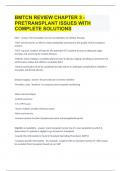
-
BMTCN TYPES OF TRANSPLANTS AND SOURCES OF STEM CELLS WITH 100% CORRECT ANSWERS
- Exam (elaborations) • 4 pages • 2023
- Available in package deal
-
- $14.99
- + learn more
3 types of Transplants -Autologous -Allogeneic -Syngeneic 3 Sources of Stem Cells -Peripheral Blood -Bone Marrow -Umbilical Cord Blood Autologous -removing stem cells from the pt with the intent to reinfuse the cells at a later date -before they are able to have their stem cells collected, pts undergo testing to ensure they are disease free or have MRD -cryopreserved until needed (can be stored indefinitely.) -lethal dose of chemo is given to pt prior to stem cell infusio...
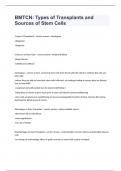
-
BMTCN Types of Transplants and Sources of Stem Cells 2023/2024 updated to pass
- Exam (elaborations) • 2 pages • 2023
- Available in package deal
-
- $9.99
- + learn more
BMTCN Types of Transplants and Sources of Stem Cells 3 types of Transplants - correct answer -Autologous -Allogeneic -Syngeneic 3 Sources of Stem Cells - correct answer -Peripheral Blood -Bone Marrow -Umbilical Cord Blood Autologous - correct answer -removing stem cells from the pt with the intent to reinfuse the cells at a later date -before they are able to have their stem cells collected, pts undergo testing to ensure they are disease free or have MRD -cryopreserved until needed ...
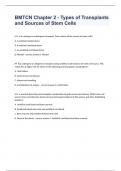
-
BMTCN Chapter 2 - Types of Transplants and Sources of Stem Cells fully solved graded A+
- Exam (elaborations) • 1 pages • 2023
- Available in package deal
-
- $9.99
- + learn more
BMTCN Chapter 2 - Types of Transplants and Sources of Stem CellsM.J. is to undergo an autologous transplant. From whom will he receive his stem cells? A. A matched related donor B. A matched unrelated donor C. An umbilical cord blood donor D. Himself - correct answer D. Himself P.F. has undergone an allogeneic transplant using umbilical cord blood as the stem cell source. This makes her at higher risk for which of the following post-transplant complications? A. Graft failure B. Graft-ve...
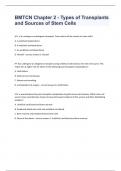
-
BMTCN Chapter 2 - Types of Transplants and Sources of Stem Cells questions well answered graded A+
- Exam (elaborations) • 1 pages • 2023
- Available in package deal
-
- $9.99
- + learn more
BMTCN Chapter 2 - Types of Transplants and Sources of Stem Cells M.J. is to undergo an autologous transplant. From whom will he receive his stem cells? A. A matched related donor B. A matched unrelated donor C. An umbilical cord blood donor D. Himself - correct answer D. Himself P.F. has undergone an allogeneic transplant using umbilical cord blood as the stem cell source. This makes her at higher risk for which of the following post-transplant complications? A. Graft failure B. Graft-...
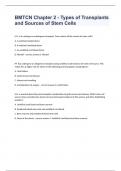
-
BMTCN Chapter 2 - Types of Transplants and Sources of Stem Cells Questions with complete solution 2023/2024
- Exam (elaborations) • 1 pages • 2023
- Available in package deal
-
- $12.89
- + learn more
BMTCN Chapter 2 - Types of Transplants and Sources of Stem Cells Questions with complete solution 2023/2024M.J. is to undergo an autologous transplant. From whom will he receive his stem cells? A. A matched related donor B. A matched unrelated donor C. An umbilical cord blood donor D. Himself - correct answer D. Himself P.F. has undergone an allogeneic transplant using umbilical cord blood as the stem cell source. This makes her at higher risk for which of the following post-transplant c...
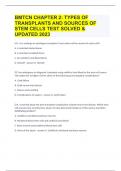
-
BMTCN CHAPTER 2 - TYPES OF TRANSPLANTS AND SOURCES OF STEM CELLS QUIZ WITH COMPLETE SOLUTIONS
- Exam (elaborations) • 1 pages • 2023
- Available in package deal
-
- $15.49
- + learn more
M.J. is to undergo an autologous transplant. From whom will he receive his stem cells? A. A matched related donor B. A matched unrelated donor C. An umbilical cord blood donor D. Himself D. Himself P.F. has undergone an allogeneic transplant using umbilical cord blood as the stem cell source. This makes her at higher risk for which of the following post-transplant complications? A. Graft failure B. Graft-versus-host disease C. Nausea and vomiting D. Complications of surgery A. G...
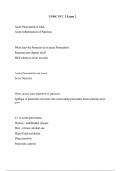
-
UNMC PCC 3 Exam 2
- Exam (elaborations) • 153 pages • 2024
-
- $13.00
- + learn more
Acute Pancreatitis is what Acute Inflammation of Pancreas What does the Pancreas do in acute Pancreatitis Pancreas auto digests itself Mild edema to sever necrosis Acute Pancreatitis can cause Sever Necrosis What causes auto-digestion of pancreas Spillage of pancreatic enzymes into surrounding pancreatic tissue causing sever pain ET of acute pancreatitis Women - Gallbladder disease Men - chronic alcohol use HyperTriglyceridemia Drug reactions Pancreatic cancers Patho of acute panc...
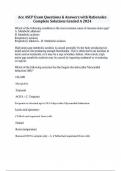
-
Ace ASCP Exam Questions & Answers with Rationales Complete Solutions Graded A 2024
- Exam (elaborations) • 129 pages • 2024
- Available in package deal
-
- $14.00
- + learn more
Which of the following condition is the most common cause of increase anion gap? A. Metabolic alkalosis B. Metabolic acidosis Respiratory acidosis Respiratory alkalosis - B. Metabolic acidosis High anion gap metabolic acidosis is caused generally by the body producing too much acid or not producing enough bicarbonate. This is often due to an increase in lactic acid or ketoacids, or it may be a sign of kidney failure. More rarely, high anion gap metabolic acidosis may be caused by ingesting meth...
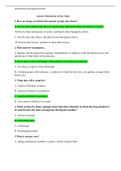
-
1. How are drugs sorted into therapeutic groups and classes?
- Exam (elaborations) • 35 pages • 2022
-
- $17.49
- 9x sold
- + learn more
NAPSRx Final Exam NAPSRX Test CNRP 1. How are drugs sorted into therapeutic groups and classes? A. first by the conditions that they are used to treat. and then by their mechanisms of action B. first by their mechanisms of action. and then by their therapeutic effects C. first by their side effects. and then by their therapeutic effects D. first by their toxicity. and then by their effectiveness 2. Bone marrow transplants... A. require that the patient first undergo chemotherapy or ra...
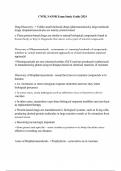
-
CNPR, NAPSR Exam Study Guide 2024
- Exam (elaborations) • 85 pages • 2024
- Available in package deal
-
- $14.00
- + learn more
Drug Discovery - • Unlike small molecule drugs (pharmaceuticals), large molecule drugs (biopharmaceuticals) are mainly protein-based o These protein-based drugs are similar to natural biological compounds found in human body or they're fragments that mimic active part of natural compounds Discovery of Pharmaceuticals - commences w/ scanning hundreds of compounds, whether w/ actual materials (irrational approach) or virtual simulations (rational approach) • Pharmaceuticals are new che...

Did you know that on average a seller on Stuvia earns $82 per month selling study resources? Hmm, hint, hint. Discover all about earning on Stuvia


